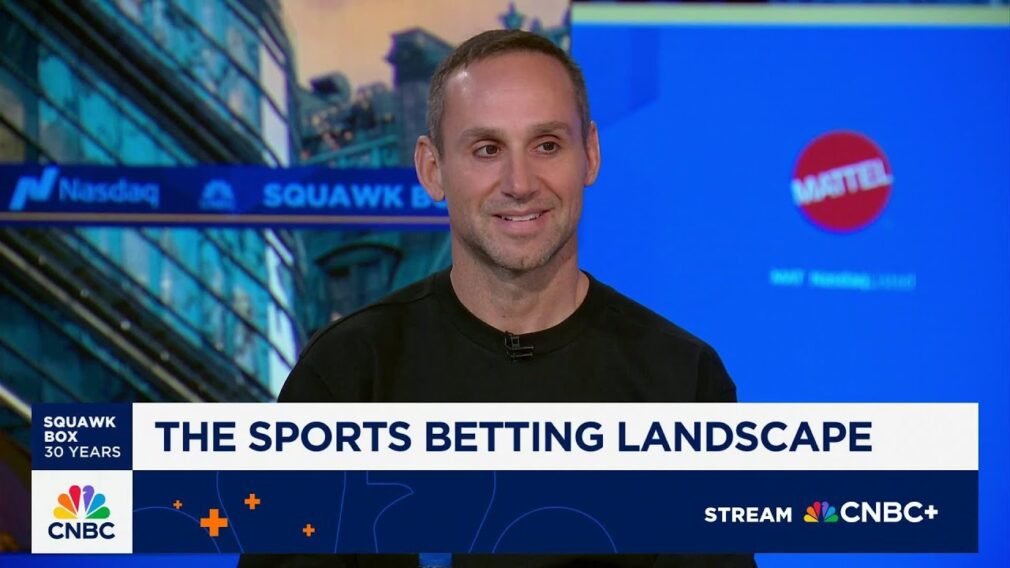Michael Rubin Eyes Betting as 40% of Fanatics Profits Within Five Years
When Michael Rubin looks at the future of Fanatics, the company’s founder and CEO sees sports betting not as a side hustle but as a core pillar of growth. In a wide-ranging conversation with CNBC, Rubin laid out how Fanatics Bet could account for up to 40% of company profits within five years, making wagering as central to Fanatics as merchandise or collectibles.

Building Toward Profitability
Rubin acknowledged the short-term losses tied to expansion, estimating a $300 million hit in 2025 and another $150 million in 2026. But by 2027, Fanatics expects to swing into the black, projecting “several hundred million” in profits from its betting arm.
The trajectory, Rubin argued, reflects a disciplined strategy. Fanatics has spent less than $2 billion to reach profitability, a fraction of what DraftKings and FanDuel poured into the market.
“We’ll lose about $300 million this year, we’ll lose about 150 next year, and then we’ll make several hundred million in 2027,” Rubin told CNBC. “We feel great about that.”
Rapid Climb in Market Share
Fanatics only started taking bets two years ago, yet it has already become the third-largest sportsbook in the U.S., trailing only DraftKings and FanDuel. Rubin said the company now holds around eight percent market share, up from four percent a year ago and zero the year before.
Both leaders control roughly 35% each, but Fanatics’ speed of ascent has made it the fastest-growing sportsbook in the market.
“It’s a two-year anniversary from when we started taking bets, and we’re now the third-largest player,” Rubin said. “We’re definitely fast.”
Fan Cash and Fair Play
Rubin credits Fanatics’ distinctive value proposition for fueling that growth. At the heart is Fan Cash, a loyalty currency given back to customers win or lose. Players can redeem it for merchandise, collectibles, tickets, or more bets. Fanatics plans to distribute $1 billion in Fan Cash in the coming year alone.
“Tying it all together makes us a much stickier place,” Rubin said. “Every time you bet with us, whether you win or lose, we give you Fan Cash that you can use for merchandise, trading cards, tickets. That’s resonating really well.”
Equally disruptive has been the Fair Play policy. If a player in a prop bet gets injured in the first half of a game, Fanatics voids the bet rather than counting it as a loss. Rubin said the program has cost the company millions, including $1.5 million in a single week, but believes it builds long-term trust.
“Fair Play is kind of like free insurance,” he explained. “It’s the right thing to do, and now competitors are copying us.”
A Shifting Industry
The CEO also framed Fanatics’ rise against the backdrop of a changing U.S. sports betting economy. A market once weighed down by costly customer acquisition has swung sharply toward profitability. DraftKings, which lost nearly a billion dollars just a few years ago, expects to earn $900 million this year. FanDuel projects $1.25 billion.
“When we got into the business in 2021, I told my board I love this business long-term, but I don’t think the economics make sense right now,” Rubin said. “By the time we launched, everything was more logical. Today it’s the most logical it’s ever been.”
Asked if he could have imagined this in 1999, Rubin said he could. Sports gambling, he argued, had long been a global industry, thriving in Europe for decades. The only surprise was how long it took the U.S. to catch up.
“It was only natural that a market that was big and vibrant but illegal here would migrate to a much more legal and safer approach,” he said.
Recommended
